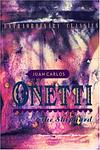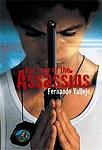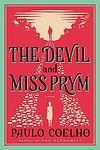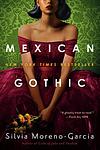The Greatest Latin American "Psychological" Books of All Time
Click to learn how this list is calculated.
Genres
The Psychological genre of books typically explores the inner workings of the human mind and emotions, often delving into complex and sometimes disturbing psychological states. These books may focus on mental illness, trauma, relationships, or personal growth, and often challenge readers to confront their own beliefs and perceptions. Psychological books may be suspenseful, thought-provoking, and emotionally intense, offering readers a deep and often unsettling glimpse into the human psyche.
Date Range
Reading Statistics
Click the button below to see how many of these books you've read!
Download
If you're interested in downloading this list as a CSV file for use in a spreadsheet application, you can easily do so by clicking the button below. Please note that to ensure a manageable file size and faster download, the CSV will include details for only the first 500 books.
Download-
1. Pedro Páramo by Juan Rulfo
This novel transports readers to the ghost town of Comala, where the protagonist, Juan Preciado, ventures in search of his estranged father, Pedro Páramo. Upon arrival, he encounters a realm where the living and the dead coexist, and through fragmented narratives and spectral encounters, the story of Pedro Páramo's life, his love, tyranny, and the curses that plague the town unfolds. The novel's innovative structure, blending memory and reality, has cemented its status as a pioneering work of magical realism, offering a haunting exploration of power, guilt, and the inescapable echoes of the past.
-
2. The Hour of the Star by Clarice Lispector
"The Hour of the Star" is a poignant narrative that explores the life of Macabéa, a poor, unattractive, and naive typist living in the slums of Rio de Janeiro. The story is narrated by Rodrigo S.M., a sophisticated writer who struggles with how to accurately portray Macabéa's simple existence and her tragic fate. The novel delves into themes of identity, poverty, and the human condition, presenting a stark contrast between the lives of the rich and the poor, the educated and the ignorant, and the beautiful and the plain.
-
3. Dom Casmurro by Machado de Assis
The novel is a darkly comic, yet tragic exploration of love, betrayal, and jealousy, told through the unreliable narration of the protagonist, a middle-aged man who believes his wife has cheated on him with his best friend. The narrative is filled with ambiguity and uncertainty, forcing readers to question the reality of the events described. The novel is also a profound exploration of the human psyche and the destructive power of obsession.
-
4. The Passion According to G.H. by Clarice Lispector
"The Passion According to G.H." is a philosophical novel that delves into the existential crisis of a wealthy Brazilian woman who, after killing a cockroach in her maid's room, experiences a profound metaphysical crisis. The narrative unfolds as a stream of consciousness that explores themes of identity, existence, and the nature of reality. The protagonist's journey forces her to confront her own humanity, the concept of nothingness, and the chaotic, interconnected nature of life. It's a profound and introspective exploration of the human condition and the meaning of existence.
-
5. Los Siete Locos by Roberto Arlt
"Los Siete Locos" is a complex and dark novel set in the 1920s in Buenos Aires. The story revolves around a man who, disillusioned with his mundane life and the corruption he sees around him, becomes involved with a group of anarchists who plan to overthrow the government. The protagonist is drawn into a world of madness, conspiracy, and philosophical debate, as he grapples with his own sanity and the morality of his actions. The book explores themes of existentialism, societal decay, and the blurred line between sanity and insanity.
-
6. The Shipyard by Juan Carlos Onetti
"The Shipyard" is a novel set in a decaying Uruguayan port town, where the protagonist, a middle-aged man recently released from jail and suffering from tuberculosis, decides to take on the impossible task of reviving a defunct shipyard. The book explores themes of existentialism, disillusionment, and the struggle for meaning in a seemingly absurd world. Despite the bleak surroundings and circumstances, the protagonist remains hopeful and committed to his ambitions, providing a poignant commentary on the human spirit's resilience.
-
7. The Time of the Hero by Mario Vargas Llosa
"The Time of the Hero" is a novel set in a military academy in Lima, Peru, where a group of cadets try to maintain their individuality and resist the dehumanizing military routine. The story revolves around a stolen exam paper, the ensuing investigation, and the brutal fallout. The novel explores themes of power, corruption, and the struggle for identity within a rigid and oppressive system, offering a critical look at the military institution and its effects on society.
-
8. The Autumn of the Patriarch by Gabriel García Márquez
The novel explores the life of an eternal dictator who has ruled over a Caribbean nation for several decades. The patriarch's oppressive regime is marked by corruption, violence, and absurdity, while his personal life is characterized by loneliness and paranoia. The narrative is a complex, non-linear exploration of power, time, and the dehumanizing effects of political tyranny. The patriarch's death prompts a reflection on his life and reign, revealing a mythical, magical, and horrifying reality.
-
9. Veronika Decides to Die by Paulo Coelho
The novel centers around Veronika, a young woman from Slovenia who, disillusioned by her life and the world, decides to commit suicide. Surviving her attempt, she wakes up in a mental institution where she learns that her failed attempt has left her with only a few days to live. During her stay, she meets a variety of characters, each with their own mental issues, who help her to see her life in a new perspective. The story explores themes of madness, individuality, and the value of life, challenging societal norms and questioning the meaning of sanity.
-
10. Kiss of the Spider Woman by Manuel Puig
"Kiss of the Spider Woman" is a novel set in an Argentine prison where two cellmates, a gay window dresser and a political revolutionary, share stories to pass the time. The window dresser recounts various films he's seen, which often involve strong, glamorous women, while the revolutionary shares his political ideologies. As they spend time together, they form an unlikely bond, exploring themes of sexuality, oppression, and the power of storytelling.
-
11. Betrayed by Rita Hayworth by Manuel Puig
The novel explores the life of a young boy growing up in a small town in Argentina during the 1930s and 1940s. It is a coming-of-age story that uses a unique narrative structure, incorporating a mix of dialogues, inner thoughts, and film scripts to depict the protagonist's life. The boy's obsession with Hollywood films and glamorous actresses, particularly Rita Hayworth, serves as an escape from his oppressive environment and shapes his understanding of the world. The book also delves into themes of sexuality, identity, and the impact of popular culture.
-
12. The Tunnel by Ernesto Sábato
The book in question is a psychological thriller that delves into the mind of a painter who becomes obsessively infatuated with a woman he barely knows. His unrequited love and spiraling madness lead him down a dark path of existential angst, culminating in a shocking act of violence. The narrative unfolds through the artist's perspective, as he reflects on his actions and the alienation he feels from society, revealing the depths of his troubled psyche and his struggle to find meaning in an indifferent world.
-
13. The Witness by Juan José Saer
"The Witness" is a novel that explores the life of a young European boy who is the only survivor of a shipwreck in the 16th century. He is found and raised by a tribe of Indians in South America, where he spends ten years of his life. The boy is eventually found by a band of Spanish conquistadors and returns to Europe, where he becomes a well-respected scholar. The story unfolds as the man, now in his 90s, recounts his experiences and struggles to reconcile his European identity with his decade-long immersion in the tribal culture.
-
14. Our Lady of the Assassins by Fernando Vallejo
This novel is a dark and gripping exploration of life in Medellín, Colombia, during the height of the drug wars. The protagonist, a middle-aged writer, returns home after many years abroad, only to find his city ravaged by violence and death. He falls in love with two teenage assassins, who guide him through the underworld of the city, exposing him to the brutal realities of life in a place where human life has lost all value. The story is a bleak commentary on the devastating effects of drug trafficking and political corruption on society.
-
15. The Devil and Miss Prym by Paulo Coelho
A stranger arrives in the small town of Viscos, carrying with him a choice that could bless or curse the entire community. The town's inhabitants are forced to confront their deepest fears and question their moral compasses as they wrestle with the stranger's proposition: he will give them a fortune in gold if they kill one of their own. The stranger's presence stirs up chaos and brings to light the darkness within the human soul, challenging the townsfolk to make a decision that will determine their future.
-
16. The Sound Of Things Falling by Juan Gabriel Vásquez
"The Sound Of Things Falling" is a thought-provoking novel that delves into the complex and haunting aftermath of the drug trade in Colombia. Set against the backdrop of a turbulent country, the story follows the lives of two men whose paths intertwine in unexpected ways. Through vivid storytelling and poignant reflections, the book explores themes of memory, guilt, and the lasting impact of violence on individuals and society.
-
17. The Murderer by Roy Heath
"The Murderer" is a gripping novel that delves into the psyche of a man who, after a lifetime of being marginalized and abused, commits a heinous crime. Set against the backdrop of Guyana's complex social and racial tensions, the story explores the protagonist's descent into violence. Through a series of flashbacks and introspective moments, the narrative examines the factors that led to his transformation from an oppressed individual into a murderer. The book is a profound commentary on the impact of colonialism, the struggle for identity, and the human capacity for violence, raising questions about justice and the possibility of redemption.
-
18. Mexican Gothic by Silvia Moreno-Garcia
In "Mexican Gothic," a young woman named Noemí travels to a remote mansion in the Mexican countryside to rescue her cousin who has seemingly fallen under the spell of her new husband. As Noemí delves deeper into the eerie and unsettling atmosphere of the house, she uncovers dark family secrets and confronts a malevolent force that threatens their lives. Blending elements of gothic horror and Mexican folklore, this atmospheric tale explores themes of colonialism, racism, and female empowerment in a captivating and chilling narrative.
-
19. Near To The Wild Heart by Clarice Lispector
The novel delves into the inner life of Joana, a young woman with a complex and introspective nature, as she navigates the vicissitudes of her existence. Through a non-linear narrative and a stream-of-consciousness technique, the reader is immersed in Joana's thoughts and experiences, ranging from her childhood to her adult relationships, including her marriage to Otávio. The protagonist's search for meaning and understanding of her own identity unfolds in poetic and philosophical reflections, revealing the struggles of self-discovery and the desire to transcend the ordinary, bringing her metaphorically 'near to the wild heart' of life itself.
-
20. Delirio(premio Alfaguara 2004) by Laura Restrepo
The novel revolves around a man who returns to Bogotá from a business trip only to find his wife has succumbed to an inexplicable bout of madness during his absence. As he seeks to uncover the roots of her delirium, he delves into her past and the dark history of his country, encountering a tapestry of characters from various strata of Colombian society. The narrative weaves together personal and political elements, exploring themes of love, violence, and the impact of the drug trade, ultimately painting a portrait of a society where reality and madness are intertwined.
-
21. The Obscene Bird Of Night by José Donoso
This novel is a labyrinthine exploration of identity, madness, and the nature of reality, told through the fragmented narrative of a reclusive man who has lived his life in seclusion on a decrepit estate. As the protagonist delves into his past, he recounts his experiences among the deformed and the destitute, the aristocracy and the servants, while grappling with his own fears and illusions. The narrative weaves a tapestry of grotesque imagery, mythological allusions, and a collapsing social order, challenging the reader to distinguish between truth and fabrication in a world where the boundaries of sanity are blurred.
-
22. Distant Star by Roberto Bolaño
"Distant Star" is a chilling novel set in Chile following the 1973 coup that overthrew Salvador Allende. The story focuses on a character who uses his position as a member of the Chilean Air Force to commit heinous acts of violence. His fascination with poetry and aerial acrobatics is interwoven with his terrifying actions, creating a disconcerting contrast. The narrative explores the horrific realities of political upheaval, the fine line between art and brutality, and the long-lasting effects of trauma.
-
23. Trust by Hernán Díaz
"Trust" by Hernán Díaz is a novel that follows the journey of a young man named Rafael, who leaves his home in Mexico to pursue the American Dream in the 19th century. Rafael's journey takes him through the Wild West, where he encounters a diverse cast of characters and faces numerous challenges. Along the way, he learns about the complexities of trust and betrayal, and ultimately discovers the true meaning of home and belonging. The novel is a poignant exploration of identity, immigration, and the American experience.
-
24. Lo Que No Tiene Nombre by Piedad Bonnett
The book is a poignant and deeply personal memoir that delves into the heart-wrenching experience of a mother grappling with her son's severe mental illness and eventual suicide. Through a raw and honest narrative, the author explores the complexities of her son's struggle with depression, the impact of his condition on their family, and the profound grief that follows his tragic death. The memoir serves as a meditation on loss, love, and the often misunderstood nature of mental health, offering a touching tribute to her son while also shedding light on the broader issues surrounding mental illness and the challenges faced by those who suffer from it and their loved ones.
Reading Statistics
Click the button below to see how many of these books you've read!
Download
If you're interested in downloading this list as a CSV file for use in a spreadsheet application, you can easily do so by clicking the button below. Please note that to ensure a manageable file size and faster download, the CSV will include details for only the first 500 books.
Download





















